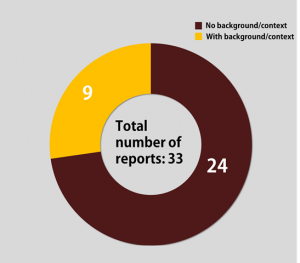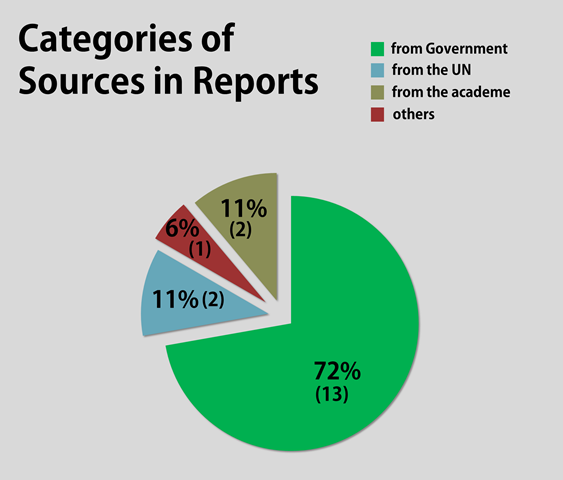Duterte and the UN: Another Media Failure to Provide Context

Duterte, in a town hall hosted by CNN Philippines on Feb. 18, 2016 at UP Diliman. Photo by Lito Ocampo
IN THE early hours of Sunday, Aug. 21, President Rodrigo Duterte held another one of his now infamous press briefings in Davao City. There, he issued a spate of statements that again made headlines. Among them was his threat to withdraw the country’s membership from the United Nations (UN) and form another organization instead perhaps with China and African countries. He had been irked earlier by the reactions of UN special rapporteurs Agnes Callamard and Dainius Puras to the killings that have been going on since Duterte launched his “war on drugs.”
It was broadcast live and so television and radio recorded the statement. Newspapers did the same on the next day. It was reported dutifully as most policy statements are picked up by the press.
The statement was quickly dismissed by some of his top officials, among them, the foreign affairs secretary and the president’s spokesperson. Both advised the public not to take this statement seriously and explained that it was an expression of how the president was feeling at the time.
Recorded live, no one can deny that the president said what he said, expressing his anger that the UN rapporteurs had criticized the killings related to his “war on drugs.” As a statement dealing with a serious international policy, it deserved to be reported. Unfortunately, the press did an amateurish job in providing crucial information related to the issue, thus missing the opportunity once again to inform the public and frame the coverage in its proper context.
Most of the reports failed to provide background to the issue of the country’s membership in the UN and the role of UN special rapporteurs. An overwhelming number of them had government sources, with only a small number coming from Philippine experts or the UN itself, which has an office in Manila.
CMFR monitored the coverage by the daily newspapers Philippine Daily Inquirer, The Philippine Star, Manila Bulletin, The Manila Times, Daily Tribune, Manila Standard and Malaya, and primetime newscasts ABS-CBN 2’s TV Patrol, GMA-7’s 24 Oras, TV5’s Aksyon and CNN Philippines’ Network News from Aug. 21 to 23 to assess reportage on the matter.
Important Points
Duterte’s threat to break away from the UN raised important points worth exploring: the protocol that the UN rapporteurs allegedly broke, the role of the UN special rapporteurs; and the implications of leaving the UN. During the monitor period, only nine out of 24 reports were able to discuss, if at all, mention these issues. As the press scrambled to report on different statements made to clarify the president’s position, these important points were left out by the media. (see Figure 1)
Print media had ample time to do further research, given that reports on Duterte’s claims made the papers the following day, Aug. 22, yet only a few of them bothered to do so. (See boxed article)

Figure 1. Breakdown of reports in print and TV
Most of the reports failed to go beyond the statements from government. After Duterte, Presidential Spokesperson Ernesto Abella and Foreign Affairs Secretary Perfecto Yasay were the most used source in the reports. They provided clarifications later, declaring that the president was not serious about his threat and that he was just “tired,” “frustrated” and “disappointed.”
Seeking Insightful Sources
Reports that consulted sources from academe proved insightful (see Figure 2). Among the interviewed academics were Prof. Richard Heydarian and Prof. Rene de Castro of De La Salle University, who discussed the implications of a Philippine withdrawal of its membership. Former envoy to the UN, Lauro Baja, was also interviewed.

Figure 2. Breakdown of sources in the reports in print and TV
Aside from Duterte, Abella and Yasay, the officials that the press included were government officials, Press Secretary Martin Andanar, Senators Alan Peter Cayetano, Sherwin Gatchalian, Richard Gordon and Ralph Recto as well as some representatives.
Most of the press quoted Secretary Yasay’s criticism of how the special rapporteurs “broke protocol” but did not examine the validity of this claim.
The media’s word for word approach on Duterte may be justifiable, given that he’s the president, which makes him a legitimate news source and subject. What the president says is an expression of policy.
|
Role of the UN Special Rapporteurs SPECIAL RAPPORTEURS are appointed by the United Nations (UN) Human Rights Council to look at particular human rights issues. The mandate of the UN special rapporteur on summary or arbitrary executions was established by resolution 1982/35 of the Economic and Social Council, as recommended by the Commission on Human Rights, according to the UN Office of the High Commissioner for Human Rights. The mandate was renewed in 1992, changing the title to “Special Rapporteur on extrajudicial, summary or arbitrary executions.” Agnes Callamard has recently taken on the position. “The mandate of the special rapporteur covers all countries, irrespective of whether a state has ratified relevant international conventions,” the OHCHR website said. Special rapporteurs can only investigate human rights issues in a specific country upon the invitation of the government. It will then write a report about its findings to be submitted to the Human Rights Council. Here is an excerpt from the Overview of the mandate: “The Human Rights Council, in its latest resolution 26/12 on the mandate of the Special Rapporteur on extrajudicial, summary or arbitrary executions, requested the Special Rapporteur, in carrying out his or her mandate: “(a) To continue to examine situations of extrajudicial, summary or arbitrary executions in all circumstances and for whatever reason, and to submit his or her findings on an annual basis, together with conclusions and recommendations, to the Human Rights Council and the General Assembly, and to draw the attention of the Council to serious situations of extrajudicial, summary or arbitrary executions that warrant immediate attention or where early action might prevent further deterioration; “(b) To continue to draw the attention of the United Nations High Commissioner for Human Rights to serious situations of extrajudicial, summary or arbitrary executions that warrant immediate attention or where early action might prevent further deterioration; “(c) To respond effectively to information which comes before him or her, in particular when an extrajudicial, summary or arbitrary execution is imminent or threatened or when such an execution has occurred; “(d) To enhance further his or her dialogue with Governments, as well as to follow up on recommendations made in reports after visits to particular countries; “(e) To continue to monitor the implementation of existing international standards on safeguards and restrictions relating to the imposition of capital punishment, bearing in mind the comments made by the Human Rights Committee in its interpretation of article 6 of the International Covenant on Civil and Political Rights, as well as the Second Optional Protocol thereto; “(f) To apply a gender perspective in his or her work. “In carrying out his/her mandate, the Special Rapporteur: “a) Transmits urgent appeals to Governments and other actors with regard to individuals reported to be at risk of imminent extrajudicial, summary or arbitrary executions, as well as communications on past alleged cases of extrajudicial, summary or arbitrary executions; “b) Undertakes country visits to examine the situation of extrajudicial, summary or arbitrary executions in the respective country, and to formulate recommendations to the Government and other actors on upholding the right to life; “c) Submits annual reports to the Human Rights Council and the General Assembly on the activities of the mandate and on the situation worldwide in regard to extrajudicial, summary or arbitrary executions and his recommendations for more effective action to combat this phenomenon.”
|
Reports must therefore work more to inform the public about policy consequences, including the role of the international community in upholding international conventions.
|
Notable Reports The Philippine Daily Inquirer, the Manila Bulletin, and The Manila Times printed reports that provided background on the UN, its role and the country’s history as a Charter member of the international body. Among the primetime newscasts, only Network News and TV Patrol ran reports that did not solely focus on Duterte’s claims but looked into the implications for the Philippines of a withdrawal from the UN. Some examples: “Baja, nagbabala na may mga seryosong implikasyon sakaling kumalas ang Pilipinas sa UN,” TV Patrol, Aug. 22 “Malacanang: PH not ‘decoupling from U.N.,” Network News, Aug. 22 “The importance of U.N. – PH relations,” Network News, Aug. 23 Rappler.com discussed what happened with some nations that left the UN in “What happened when Indonesia ‘withdrew’ from the United Nations?” (Aug. 22). The site also enumerated the benefits of UN membership in “What did UN do for PH? Disaster response, health programs, and more,” (Aug. 23). A piece in October 2015 also noted the role of the Philippines in the organization (“FAST FACTS: The Philippines’ role in the United Nations,” Oct. 24, 2015). The UN is a complicated system that requires the press to provide clearer and simpler explanations. Efforts such as the ones showed by these few media outlets are therefore commendable.
|
httpss://www.philstar.com/news-feature/2016/08/23/1616117/can-duterte-withdraw-philippine-membership-un I read this. You missed this i think. It explains not the implications, but whether the Philippines can actually withdraw. And how mistaken the president was